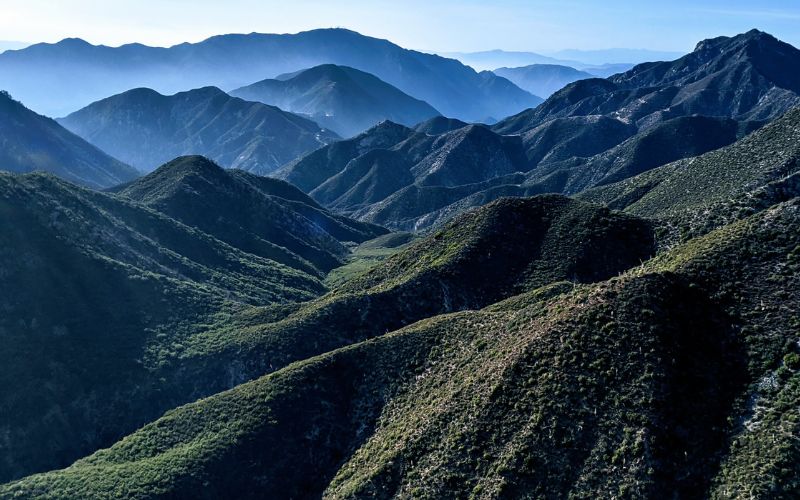
- Details
- By Kaili Berg
President Biden announced today that the San Gabriel Mountains and Berryessa Snow Mountain National Monuments will be expanded by 120,000 acres.
The Berryessa Snow Mountain National Monument, located northwest of Sacramento, encompasses nearly 331,000 acres. President Biden's proclamation aims to increase the size of this monument by 13,696 acres, offering opportunities for various recreational activities.
In Northern California, the Yocha Dehe Wintun Nation's efforts to include Molok Luyuk (Condor Ridge) within the Berryessa Snow Mountain Monument highlight its millennia-old connection to their heritage. The area holds immense importance for religious ceremonies and trade routes.
“We thank President Biden for expanding the Berryessa Snow Mountain National Monument and protecting Molok Luyuk, an area steeped in thousands of years of rich history and profound meaning to the Patwin people, whose traditional territory stretches south from these hills to the shores of San Pablo Bay and east to the Sacramento River,” said Yocha Dehe Tribal Chairman Anthony Roberts in a press release. “Elements of the natural landscape on the ridge have traditional cultural significance to us. We look forward to the day when condors fly over Molok Luyuk once again.”
Reps. John Garamendi (D-Calif.) and Mike Thompson (D-Calif.) have led legislative efforts to enlarge the monument and facilitate tribal co-management. The presidential proclamation will rename the additional ridgeline Molok Luyuk and explore co-stewardship with Tribal Nations.
In Southern California, the Fernandeño Tataviam Band of Mission Indians and the Gabrieleno San Gabriel Band of Mission Indians advocated for the expansion of the San Gabriel Mountains National Monument, emphasizing its rich cultural heritage.
“We are thrilled that the San Gabriel Mountains National Monument is expanding,” Rudy Ortega Jr., President of the Fernandeño Tataviam Band of Mission Indians said in a press release. “We thank the Biden administration for making this longstanding vision a reality. Expanding the monument helps protect lands of cultural importance to my people who are part of this nation's history and who have cared for these lands since time immemorial. It also further protects areas that are critical for our environment and the wildlife and plants that depend on this landscape."
Sen. Alex Padilla (D-Calif.) and Rep. Judy Chu (D-Calif.) have championed legislation to enlarge the San Gabriel Mountains National Monument, but the measure has stalled in the divided Congress. Biden used his executive authority under the 1906 Antiquities Act to bypass the gridlock on Capitol Hill.
President Biden's plan expands the San Gabriel Mountains National Monument, east of Los Angeles, by 105,919 acres, adding to its existing 346,000-acre span in the Angeles National Forest. These mountains provide sanctuary for various species, while Molok Luyuk serves as a vital wildlife corridor and habitat for over 30 rare plant species.
The expansion reflects a commitment to honoring tribal heritage, achieving federal conservation goals, and tackling climate change, according to the White House. It responds to calls from California Tribes and Indigenous leaders to safeguard culturally significant landscapes.
The expansion of these two national monuments will also help address the climate and biodiversity crises by protecting important habitat and wildlife corridors and contributing to state and federal goals to conserve 30% of public lands and waters by 2030.
“I’m thrilled and deeply thankful,” California Natural Resources Secretary Wade Crowfoot said in a press release. “President Biden’s action protects two very special places in California for future generations.”
More Stories Like This
Michigan Tribes Tell Supreme Court: Don’t Bail Out EnbridgeAlaskans Raise More Than $1 Million For Communities Devastated by Typhoon Halong
A True American Tale: Indigenous Rights vs. Corporate Greed
In photos: Residents of Western Alaska Share Storm Damage of Ex-Typhoon Halong
Where the Buffalo Roam: Tribes Lead Bison Return for Food Sovereignty
Help us tell the stories that could save Native languages and food traditions
At a critical moment for Indian Country, Native News Online is embarking on our most ambitious reporting project yet: "Cultivating Culture," a three-year investigation into two forces shaping Native community survival—food sovereignty and language revitalization.
The devastating impact of COVID-19 accelerated the loss of Native elders and with them, irreplaceable cultural knowledge. Yet across tribal communities, innovative leaders are fighting back, reclaiming traditional food systems and breathing new life into Native languages. These aren't just cultural preservation efforts—they're powerful pathways to community health, healing, and resilience.
Our dedicated reporting team will spend three years documenting these stories through on-the-ground reporting in 18 tribal communities, producing over 200 in-depth stories, 18 podcast episodes, and multimedia content that amplifies Indigenous voices. We'll show policymakers, funders, and allies how cultural restoration directly impacts physical and mental wellness while celebrating successful models of sovereignty and self-determination.
This isn't corporate media parachuting into Indian Country for a quick story. This is sustained, relationship-based journalism by Native reporters who understand these communities. It's "Warrior Journalism"—fearless reporting that serves the 5.5 million readers who depend on us for news that mainstream media often ignores.
We need your help right now. While we've secured partial funding, we're still $450,000 short of our three-year budget. Our immediate goal is $25,000 this month to keep this critical work moving forward—funding reporter salaries, travel to remote communities, photography, and the deep reporting these stories deserve.
Every dollar directly supports Indigenous journalists telling Indigenous stories. Whether it's $5 or $50, your contribution ensures these vital narratives of resilience, innovation, and hope don't disappear into silence.
 The stakes couldn't be higher. Native languages are being lost at an alarming rate. Food insecurity plagues many tribal communities. But solutions are emerging, and these stories need to be told.
The stakes couldn't be higher. Native languages are being lost at an alarming rate. Food insecurity plagues many tribal communities. But solutions are emerging, and these stories need to be told.
Support independent Native journalism. Fund the stories that matter.
Levi Rickert (Potawatomi), Editor & Publisher

